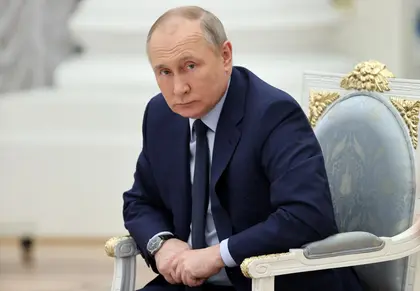Russian President Vladimir Putin, who announced Friday he is running for a fifth term, has over the past two decades built a system of domestic repression and confrontation with the West that is almost certain to guarantee his re-election.
Ever since the former little-known KGB agent first became president on New Year's Eve 1999, he has consolidated power by bringing oligarchs to heel, banning any real opposition, and turning Russia into an authoritarian state. Abroad, he has led world efforts to challenge the dominance of the West.
JOIN US ON TELEGRAM
Follow our coverage of the war on the @Kyivpost_official.
His grip on power further tightened in the wake of his decision to invade Ukraine in February 2022, with public dissent against the war effectively silenced through lengthy prison terms for critics.
Friday, the 71-year-old said after a military awards ceremony at the Kremlin that - as expected - he will run in next March's presidential elections.
His rule has risked being defined by the war in Ukraine, which has cost many thousands of lives and sparked unprecedented Western sanctions that have created major tensions in the economy.
There were large anti-war protests in the day after he ordered troops into Ukraine in the early hours of February 24, 2022.
They were quickly put down but were followed months later by more demonstrations when the government was forced to announce a partial mobilisation after Russia failed to topple Ukraine's government in the opening offensive of the war.

Moldova Investigates Russian Missile, Romania Says No Airspace Violation
The most serious challenge to his long rule came in June 2023 when Yevgeny Prigozhin, a long-time ally and head of the Wagner mercenary group announced a mutiny to unseat the military leadership.
The bloody uprising threatened to tarnish Putin's self-created image as a strategic genius who likes to compare himself to Peter the Great -- the reform-minded emperor who expanded Russia's borders.
But in recent months, Putin has demonstrated his lasting power. Domestic opposition has been largely silent, the economy is growing again, the Russian military has largely repulsed a recent Ukrainian offensive, and he has resumed foreign travel.
- Early reform hopes -
Putin started out as an intelligence officer before embarking on a political career in the mayor's office in his native Saint Petersburg in 1991 as the Soviet Union was falling apart.
Yeltsin, Russia's first president, appointed him as head of the FSB security service in 1998, and as prime minister the following year.
It was a carefully planned strategy, culminating in his nomination as acting president when Yeltsin resigned.
Putin won his first presidential election in March 2000 and a second term in 2004.
His rise initially spurred hopes that Russia would reform and become a predictable, democratic partner on the global stage.
Putin gained popularity by promising stability to a country still reeling from a decade of humiliation and economic chaos following the Soviet collapse.
Then-US President George W. Bush hailed him as a "remarkable leader". Russia's leader grew close with Germany's Gerhard Schroeder and Italy's Silvio Berlusconi, even as he clamped down on media and waged a ruthless war in Chechnya.
Two decades later, that goodwill has gone.
Joe Biden -- the fifth US president of Putin's tenure -- called him a "killer," even before the launch of full-scale hostilities in Ukraine.
- 'New Iron Curtain' -
After two stints as president, Putin switched back to being prime minister in 2008 to get around a constitutional ban on more than two consecutive terms.
But he kept the reins of power firmly in hand and returned to the presidency in 2012 despite pro-democracy protests in Moscow, winning a fourth term in 2018.
He jailed his loudest rival, Alexei Navalny, in 2021 shortly after being accused by the West and the opposition leader of ordering Navalny's poisoning with a Soviet-designed nerve agent.
The clampdown on opposition movements ramped up after the launch of hostilities in Ukraine, with thousands of Russians handed long prison sentences on newly beefed-up censorship laws.
The West imposed sanctions that effectively cut off Russia from the global banking system, adding to the Russian leadership's siege mentality.
In October, Putin accused Europe of creating a "new Iron Curtain" and said Russia was building "a new world" that would not be based on Western hegemony.
He has also increasingly pushed a domestic agenda of nationalism and social conservatism, including most recently laws against Russia's LGBTQ community.
- Growing confidence -
Persona non grata among Western leaders after the invasion, the Russian strongman has sought to pivot east, wooing India and China with increased energy exports.
After shrinking in 2022, the Russian economy began to grow again in the second quarter of this year despite high inflation, a weakening of the ruble and a drastic increase in defence spending.
The war failed in its initial aims to topple Ukraine's government and Russia was forced into a series of humiliating setbacks by the determined defence of the much smaller Ukrainian army.
But, as the war nears its second anniversary, Putin has been speaking with increased confidence about Russia's prospects on the battlefield -- a topic he avoided for many months.
Russian forces have successfully held off a much-hyped Ukrainian counter-offensive and there are increasing doubts about the continuation of Western military supplies.
Wrangling in Washington in recent weeks has held up tens of billions in military aid for Ukraine, prompting alarmist warnings from the US administration.
"Congress has to decide whether to continue to support the fight for freedom in Ukraine... or whether Congress will ignore the lessons we've learned from history and let Putin prevail," National Security Advisor Jake Sullivan said.
You can also highlight the text and press Ctrl + Enter






